Entrepreneurship and Small Business Management Report - Module XYZ
VerifiedAdded on 2023/01/05
|16
|3970
|62
Report
AI Summary
This report delves into the multifaceted world of entrepreneurship and small business management. It begins by exploring various forms of entrepreneurial ventures, differentiating between small business, social, and scalable start-up models, and relating them to entrepreneurial typologies such as innovative and imitating entrepreneurs. The report then examines the impact of micro and small businesses on the economy, providing data and statistics to illustrate their significance in generating employment and contributing to the social economy. Furthermore, it analyzes the differences between small, medium, and large businesses, evaluating their influence at local, regional, national, and international levels. The report also investigates the characteristic traits and skills of successful entrepreneurs, contrasting them with those of business managers, using examples like Zuber and Mohsin Issa to highlight key attributes such as honesty, passion, and time management. Finally, it discusses how personal background and experience can both hinder and foster entrepreneurship, providing a comprehensive overview of the entrepreneurial landscape.

Entrepreneurshi
p and Small
Business
Management
p and Small
Business
Management
Paraphrase This Document
Need a fresh take? Get an instant paraphrase of this document with our AI Paraphraser
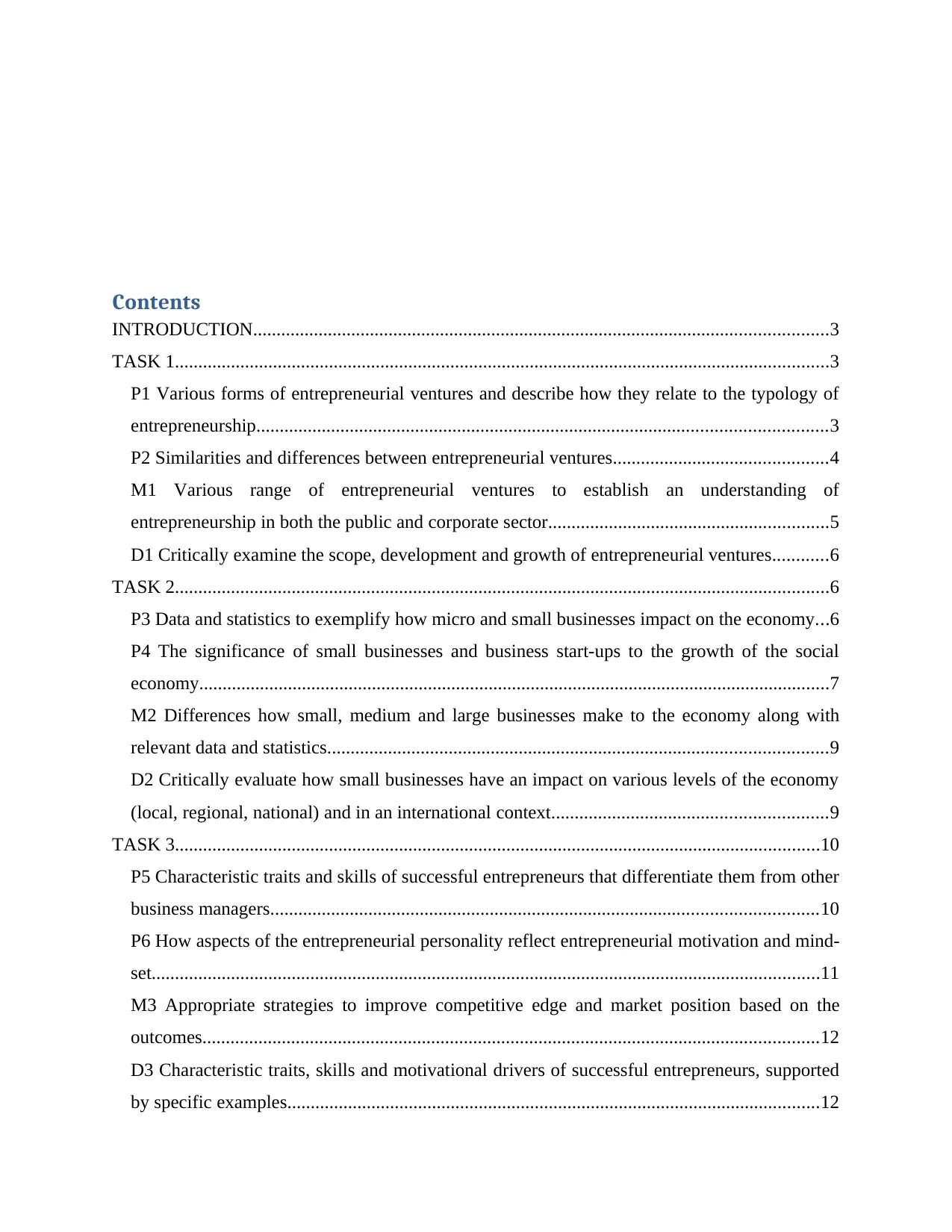
Contents
INTRODUCTION...........................................................................................................................3
TASK 1............................................................................................................................................3
P1 Various forms of entrepreneurial ventures and describe how they relate to the typology of
entrepreneurship..........................................................................................................................3
P2 Similarities and differences between entrepreneurial ventures..............................................4
M1 Various range of entrepreneurial ventures to establish an understanding of
entrepreneurship in both the public and corporate sector............................................................5
D1 Critically examine the scope, development and growth of entrepreneurial ventures............6
TASK 2............................................................................................................................................6
P3 Data and statistics to exemplify how micro and small businesses impact on the economy...6
P4 The significance of small businesses and business start-ups to the growth of the social
economy.......................................................................................................................................7
M2 Differences how small, medium and large businesses make to the economy along with
relevant data and statistics...........................................................................................................9
D2 Critically evaluate how small businesses have an impact on various levels of the economy
(local, regional, national) and in an international context...........................................................9
TASK 3..........................................................................................................................................10
P5 Characteristic traits and skills of successful entrepreneurs that differentiate them from other
business managers.....................................................................................................................10
P6 How aspects of the entrepreneurial personality reflect entrepreneurial motivation and mind-
set...............................................................................................................................................11
M3 Appropriate strategies to improve competitive edge and market position based on the
outcomes....................................................................................................................................12
D3 Characteristic traits, skills and motivational drivers of successful entrepreneurs, supported
by specific examples..................................................................................................................12
INTRODUCTION...........................................................................................................................3
TASK 1............................................................................................................................................3
P1 Various forms of entrepreneurial ventures and describe how they relate to the typology of
entrepreneurship..........................................................................................................................3
P2 Similarities and differences between entrepreneurial ventures..............................................4
M1 Various range of entrepreneurial ventures to establish an understanding of
entrepreneurship in both the public and corporate sector............................................................5
D1 Critically examine the scope, development and growth of entrepreneurial ventures............6
TASK 2............................................................................................................................................6
P3 Data and statistics to exemplify how micro and small businesses impact on the economy...6
P4 The significance of small businesses and business start-ups to the growth of the social
economy.......................................................................................................................................7
M2 Differences how small, medium and large businesses make to the economy along with
relevant data and statistics...........................................................................................................9
D2 Critically evaluate how small businesses have an impact on various levels of the economy
(local, regional, national) and in an international context...........................................................9
TASK 3..........................................................................................................................................10
P5 Characteristic traits and skills of successful entrepreneurs that differentiate them from other
business managers.....................................................................................................................10
P6 How aspects of the entrepreneurial personality reflect entrepreneurial motivation and mind-
set...............................................................................................................................................11
M3 Appropriate strategies to improve competitive edge and market position based on the
outcomes....................................................................................................................................12
D3 Characteristic traits, skills and motivational drivers of successful entrepreneurs, supported
by specific examples..................................................................................................................12
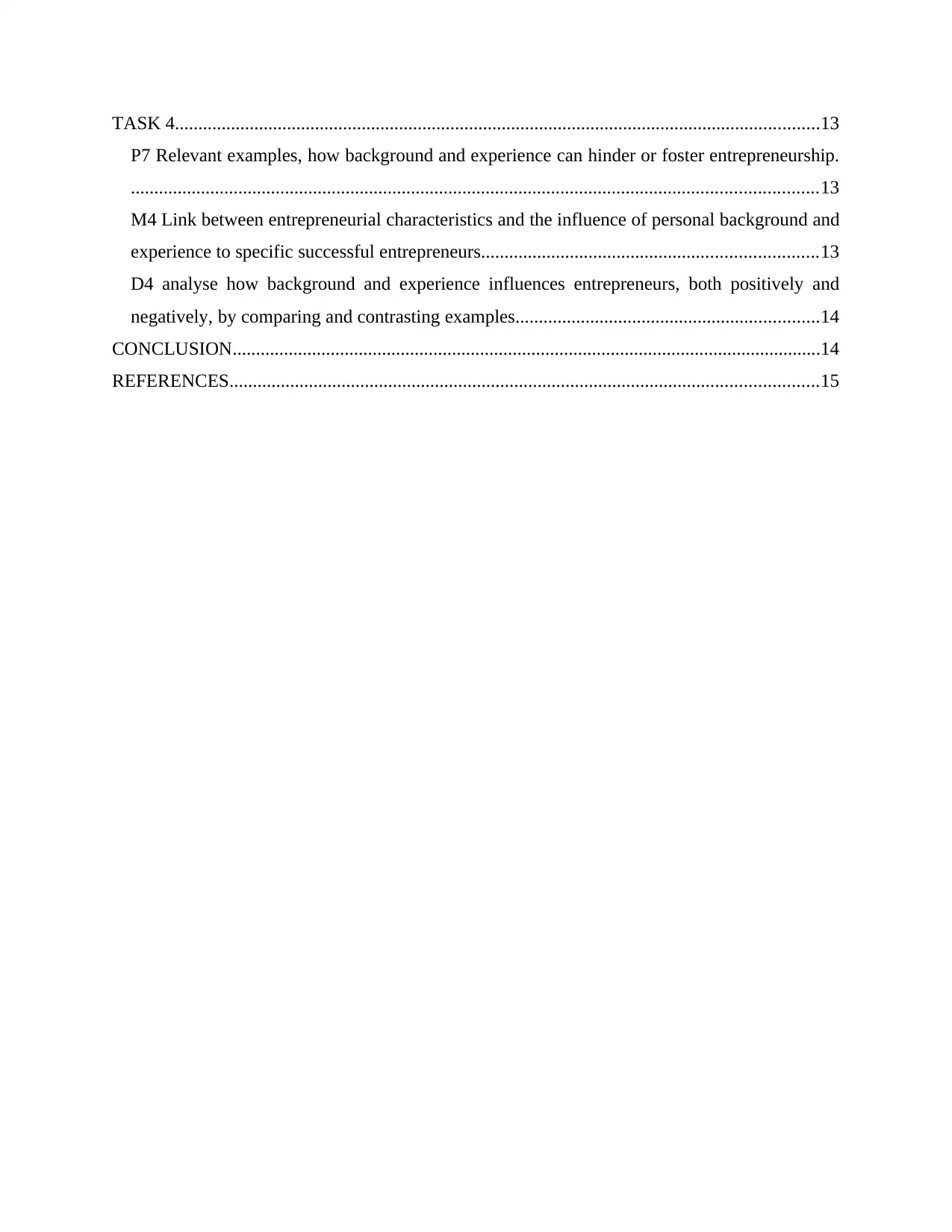
TASK 4..........................................................................................................................................13
P7 Relevant examples, how background and experience can hinder or foster entrepreneurship.
...................................................................................................................................................13
M4 Link between entrepreneurial characteristics and the influence of personal background and
experience to specific successful entrepreneurs........................................................................13
D4 analyse how background and experience influences entrepreneurs, both positively and
negatively, by comparing and contrasting examples.................................................................14
CONCLUSION..............................................................................................................................14
REFERENCES..............................................................................................................................15
P7 Relevant examples, how background and experience can hinder or foster entrepreneurship.
...................................................................................................................................................13
M4 Link between entrepreneurial characteristics and the influence of personal background and
experience to specific successful entrepreneurs........................................................................13
D4 analyse how background and experience influences entrepreneurs, both positively and
negatively, by comparing and contrasting examples.................................................................14
CONCLUSION..............................................................................................................................14
REFERENCES..............................................................................................................................15
⊘ This is a preview!⊘
Do you want full access?
Subscribe today to unlock all pages.

Trusted by 1+ million students worldwide
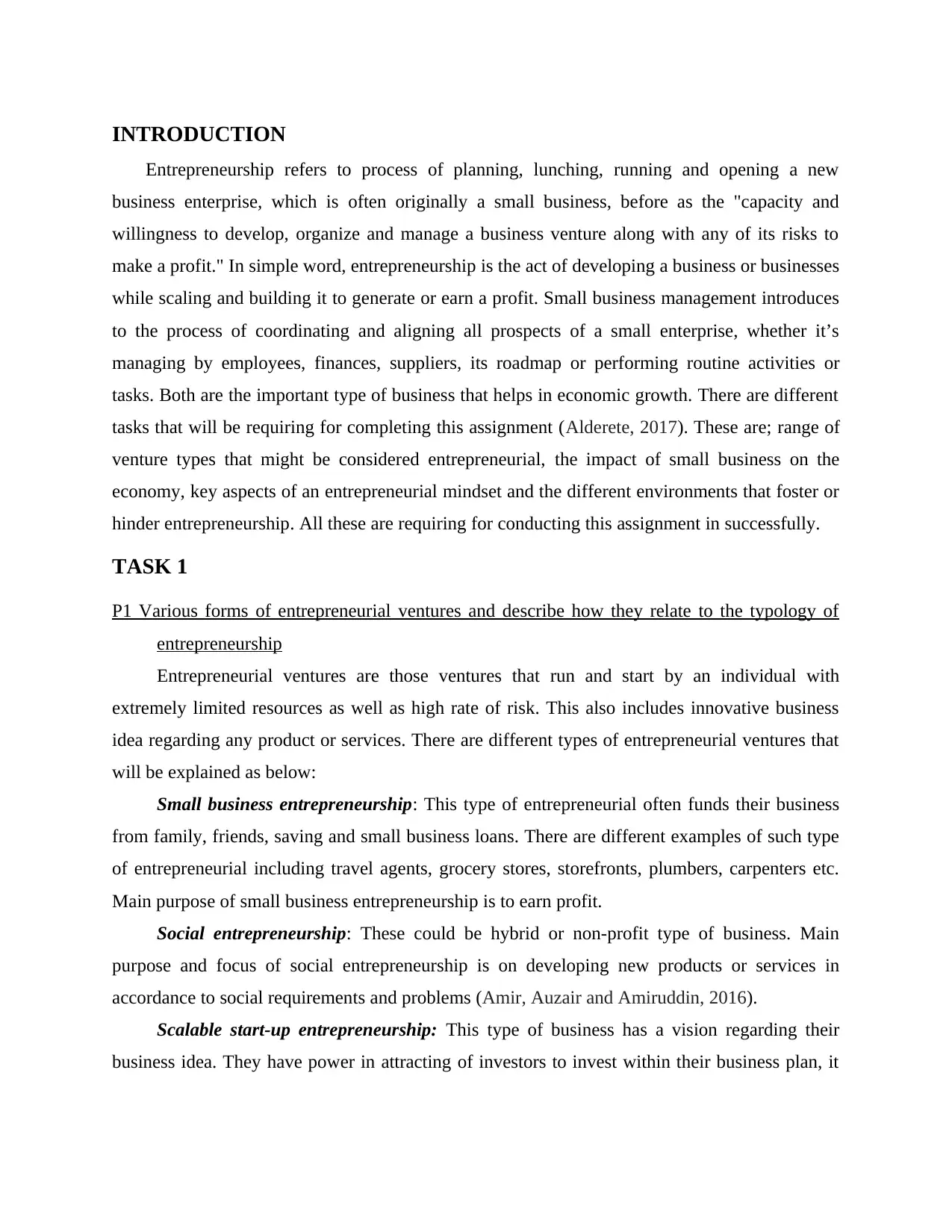
INTRODUCTION
Entrepreneurship refers to process of planning, lunching, running and opening a new
business enterprise, which is often originally a small business, before as the "capacity and
willingness to develop, organize and manage a business venture along with any of its risks to
make a profit." In simple word, entrepreneurship is the act of developing a business or businesses
while scaling and building it to generate or earn a profit. Small business management introduces
to the process of coordinating and aligning all prospects of a small enterprise, whether it’s
managing by employees, finances, suppliers, its roadmap or performing routine activities or
tasks. Both are the important type of business that helps in economic growth. There are different
tasks that will be requiring for completing this assignment (Alderete, 2017). These are; range of
venture types that might be considered entrepreneurial, the impact of small business on the
economy, key aspects of an entrepreneurial mindset and the different environments that foster or
hinder entrepreneurship. All these are requiring for conducting this assignment in successfully.
TASK 1
P1 Various forms of entrepreneurial ventures and describe how they relate to the typology of
entrepreneurship
Entrepreneurial ventures are those ventures that run and start by an individual with
extremely limited resources as well as high rate of risk. This also includes innovative business
idea regarding any product or services. There are different types of entrepreneurial ventures that
will be explained as below:
Small business entrepreneurship: This type of entrepreneurial often funds their business
from family, friends, saving and small business loans. There are different examples of such type
of entrepreneurial including travel agents, grocery stores, storefronts, plumbers, carpenters etc.
Main purpose of small business entrepreneurship is to earn profit.
Social entrepreneurship: These could be hybrid or non-profit type of business. Main
purpose and focus of social entrepreneurship is on developing new products or services in
accordance to social requirements and problems (Amir, Auzair and Amiruddin, 2016).
Scalable start-up entrepreneurship: This type of business has a vision regarding their
business idea. They have power in attracting of investors to invest within their business plan, it
Entrepreneurship refers to process of planning, lunching, running and opening a new
business enterprise, which is often originally a small business, before as the "capacity and
willingness to develop, organize and manage a business venture along with any of its risks to
make a profit." In simple word, entrepreneurship is the act of developing a business or businesses
while scaling and building it to generate or earn a profit. Small business management introduces
to the process of coordinating and aligning all prospects of a small enterprise, whether it’s
managing by employees, finances, suppliers, its roadmap or performing routine activities or
tasks. Both are the important type of business that helps in economic growth. There are different
tasks that will be requiring for completing this assignment (Alderete, 2017). These are; range of
venture types that might be considered entrepreneurial, the impact of small business on the
economy, key aspects of an entrepreneurial mindset and the different environments that foster or
hinder entrepreneurship. All these are requiring for conducting this assignment in successfully.
TASK 1
P1 Various forms of entrepreneurial ventures and describe how they relate to the typology of
entrepreneurship
Entrepreneurial ventures are those ventures that run and start by an individual with
extremely limited resources as well as high rate of risk. This also includes innovative business
idea regarding any product or services. There are different types of entrepreneurial ventures that
will be explained as below:
Small business entrepreneurship: This type of entrepreneurial often funds their business
from family, friends, saving and small business loans. There are different examples of such type
of entrepreneurial including travel agents, grocery stores, storefronts, plumbers, carpenters etc.
Main purpose of small business entrepreneurship is to earn profit.
Social entrepreneurship: These could be hybrid or non-profit type of business. Main
purpose and focus of social entrepreneurship is on developing new products or services in
accordance to social requirements and problems (Amir, Auzair and Amiruddin, 2016).
Scalable start-up entrepreneurship: This type of business has a vision regarding their
business idea. They have power in attracting of investors to invest within their business plan, it
Paraphrase This Document
Need a fresh take? Get an instant paraphrase of this document with our AI Paraphraser

called venture capitalists. For examples: start-ups in Silicon Valley, Shanghai, New York, and
Bangalore etc.
Typologies of entrepreneurship: There are different types of typologies that will be
defined as below:
Innovative entrepreneur: This sort incorporates the individuals who develop the novel
thoughts, new items, strategies or cycle. These are the pioneer’s sorts of business visionaries who
find markets for their own. Those individuals are daring person and add to the monetary
advancement of the nation.
Imitating entrepreneurs: It incorporates those business visionaries who promptly
duplicate any new innovation made by others. Those could undoubtedly discover into those
territories where there are absence of assets due to less assets no advancement could be create
there.
Entrepreneur ventures interrelates with entrepreneur typology
Entrepreneurial Venture Typologies of
entrepreneurship
Interrelation
Small business
entrepreneurship:
Innovative entrepreneur Less capital
Professional skills needed
No communication skills
No investment
Innovation required
Social entrepreneurship Imitating entrepreneur Big investment required
Uncertainty for profitability
P2 Similarities and differences between entrepreneurial ventures
Similarities and difference between entrepreneurial ventures will be defined as below:
Types of
venture
Public Private Social Macro Micro Small
Similarities Main motive
of this type
They have
different
Main
purpose of
They cover
big level in
Main aim
of this
This type of venture
aims in profit
Bangalore etc.
Typologies of entrepreneurship: There are different types of typologies that will be
defined as below:
Innovative entrepreneur: This sort incorporates the individuals who develop the novel
thoughts, new items, strategies or cycle. These are the pioneer’s sorts of business visionaries who
find markets for their own. Those individuals are daring person and add to the monetary
advancement of the nation.
Imitating entrepreneurs: It incorporates those business visionaries who promptly
duplicate any new innovation made by others. Those could undoubtedly discover into those
territories where there are absence of assets due to less assets no advancement could be create
there.
Entrepreneur ventures interrelates with entrepreneur typology
Entrepreneurial Venture Typologies of
entrepreneurship
Interrelation
Small business
entrepreneurship:
Innovative entrepreneur Less capital
Professional skills needed
No communication skills
No investment
Innovation required
Social entrepreneurship Imitating entrepreneur Big investment required
Uncertainty for profitability
P2 Similarities and differences between entrepreneurial ventures
Similarities and difference between entrepreneurial ventures will be defined as below:
Types of
venture
Public Private Social Macro Micro Small
Similarities Main motive
of this type
They have
different
Main
purpose of
They cover
big level in
Main aim
of this
This type of venture
aims in profit
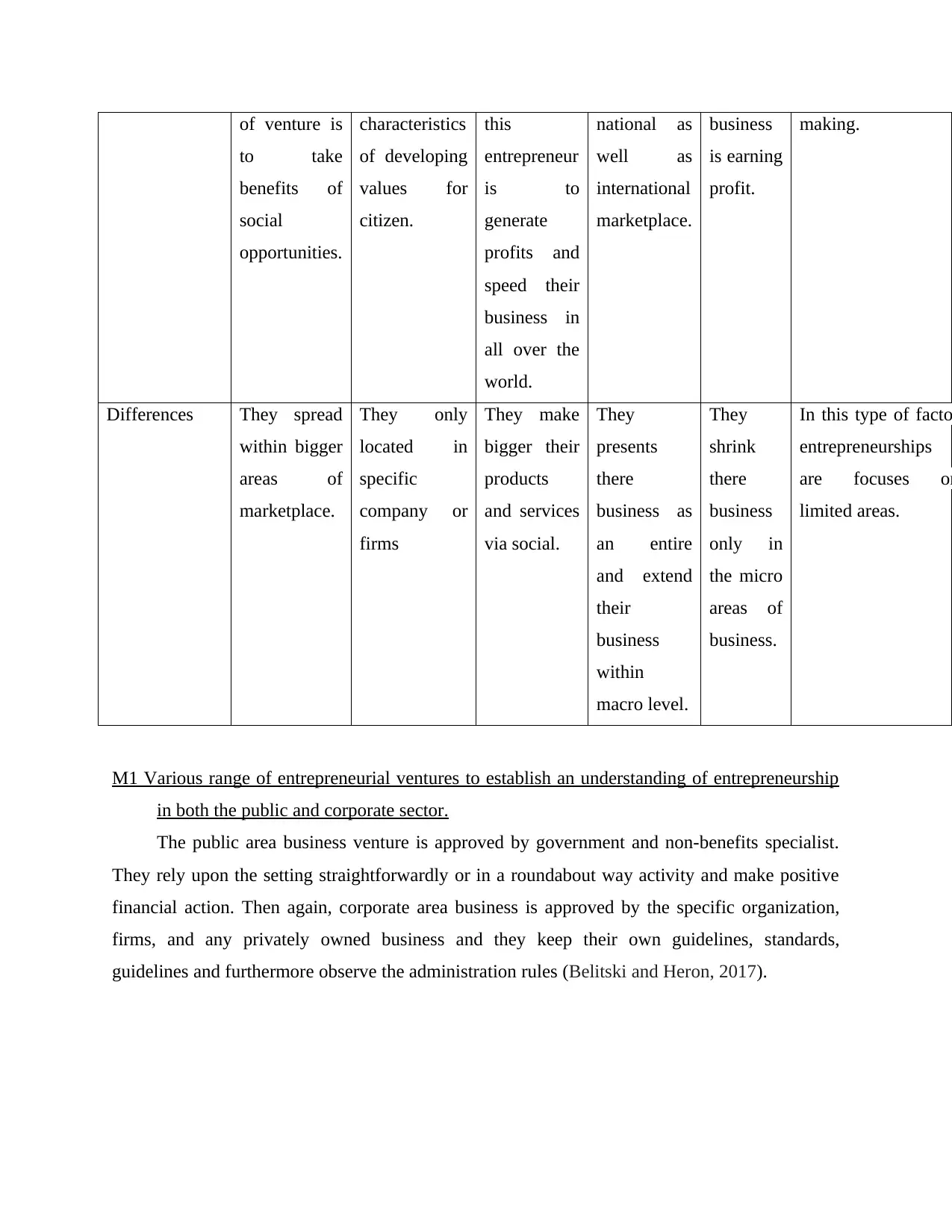
of venture is
to take
benefits of
social
opportunities.
characteristics
of developing
values for
citizen.
this
entrepreneur
is to
generate
profits and
speed their
business in
all over the
world.
national as
well as
international
marketplace.
business
is earning
profit.
making.
Differences They spread
within bigger
areas of
marketplace.
They only
located in
specific
company or
firms
They make
bigger their
products
and services
via social.
They
presents
there
business as
an entire
and extend
their
business
within
macro level.
They
shrink
there
business
only in
the micro
areas of
business.
In this type of facto
entrepreneurships
are focuses on
limited areas.
M1 Various range of entrepreneurial ventures to establish an understanding of entrepreneurship
in both the public and corporate sector.
The public area business venture is approved by government and non-benefits specialist.
They rely upon the setting straightforwardly or in a roundabout way activity and make positive
financial action. Then again, corporate area business is approved by the specific organization,
firms, and any privately owned business and they keep their own guidelines, standards,
guidelines and furthermore observe the administration rules (Belitski and Heron, 2017).
to take
benefits of
social
opportunities.
characteristics
of developing
values for
citizen.
this
entrepreneur
is to
generate
profits and
speed their
business in
all over the
world.
national as
well as
international
marketplace.
business
is earning
profit.
making.
Differences They spread
within bigger
areas of
marketplace.
They only
located in
specific
company or
firms
They make
bigger their
products
and services
via social.
They
presents
there
business as
an entire
and extend
their
business
within
macro level.
They
shrink
there
business
only in
the micro
areas of
business.
In this type of facto
entrepreneurships
are focuses on
limited areas.
M1 Various range of entrepreneurial ventures to establish an understanding of entrepreneurship
in both the public and corporate sector.
The public area business venture is approved by government and non-benefits specialist.
They rely upon the setting straightforwardly or in a roundabout way activity and make positive
financial action. Then again, corporate area business is approved by the specific organization,
firms, and any privately owned business and they keep their own guidelines, standards,
guidelines and furthermore observe the administration rules (Belitski and Heron, 2017).
⊘ This is a preview!⊘
Do you want full access?
Subscribe today to unlock all pages.

Trusted by 1+ million students worldwide
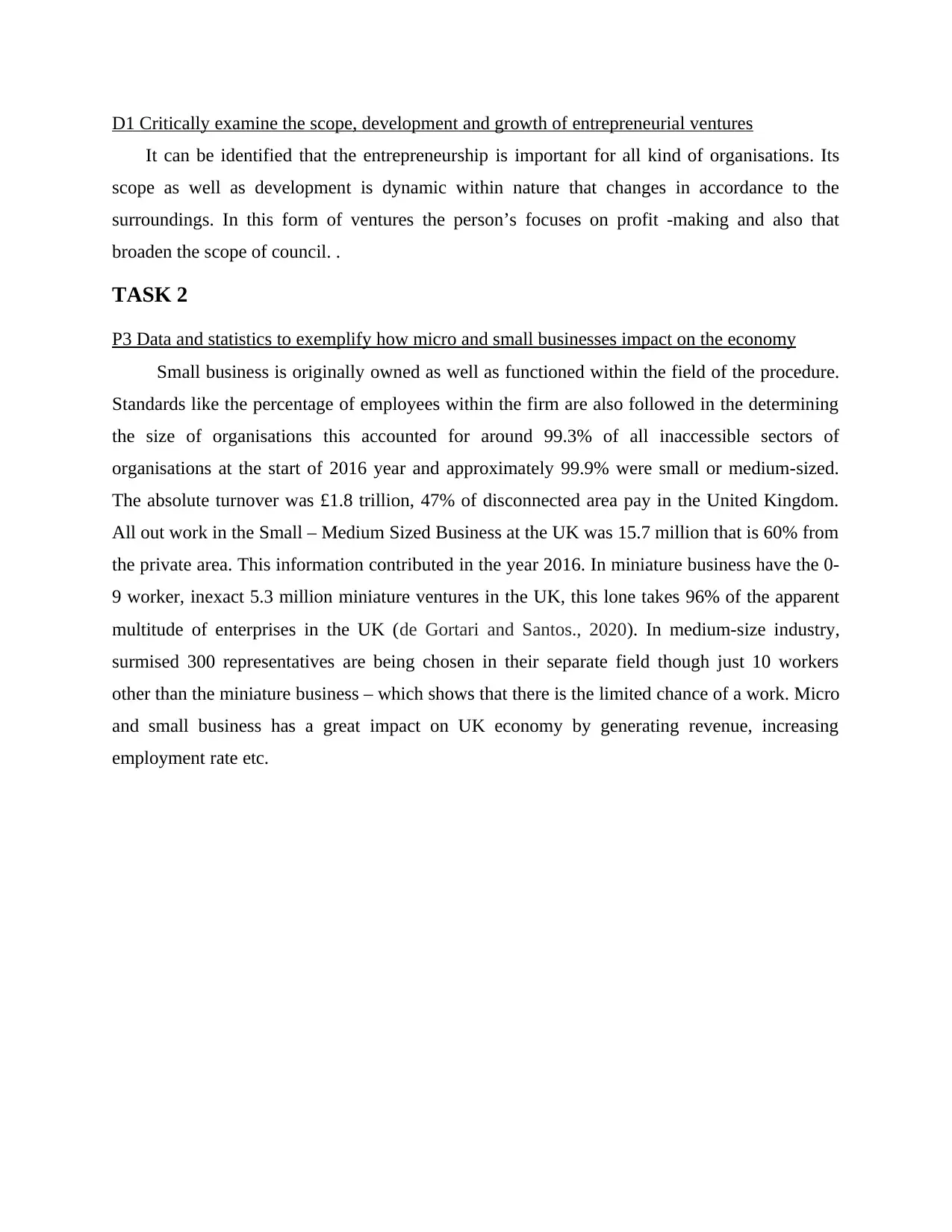
D1 Critically examine the scope, development and growth of entrepreneurial ventures
It can be identified that the entrepreneurship is important for all kind of organisations. Its
scope as well as development is dynamic within nature that changes in accordance to the
surroundings. In this form of ventures the person’s focuses on profit -making and also that
broaden the scope of council. .
TASK 2
P3 Data and statistics to exemplify how micro and small businesses impact on the economy
Small business is originally owned as well as functioned within the field of the procedure.
Standards like the percentage of employees within the firm are also followed in the determining
the size of organisations this accounted for around 99.3% of all inaccessible sectors of
organisations at the start of 2016 year and approximately 99.9% were small or medium-sized.
The absolute turnover was £1.8 trillion, 47% of disconnected area pay in the United Kingdom.
All out work in the Small – Medium Sized Business at the UK was 15.7 million that is 60% from
the private area. This information contributed in the year 2016. In miniature business have the 0-
9 worker, inexact 5.3 million miniature ventures in the UK, this lone takes 96% of the apparent
multitude of enterprises in the UK (de Gortari and Santos., 2020). In medium-size industry,
surmised 300 representatives are being chosen in their separate field though just 10 workers
other than the miniature business – which shows that there is the limited chance of a work. Micro
and small business has a great impact on UK economy by generating revenue, increasing
employment rate etc.
It can be identified that the entrepreneurship is important for all kind of organisations. Its
scope as well as development is dynamic within nature that changes in accordance to the
surroundings. In this form of ventures the person’s focuses on profit -making and also that
broaden the scope of council. .
TASK 2
P3 Data and statistics to exemplify how micro and small businesses impact on the economy
Small business is originally owned as well as functioned within the field of the procedure.
Standards like the percentage of employees within the firm are also followed in the determining
the size of organisations this accounted for around 99.3% of all inaccessible sectors of
organisations at the start of 2016 year and approximately 99.9% were small or medium-sized.
The absolute turnover was £1.8 trillion, 47% of disconnected area pay in the United Kingdom.
All out work in the Small – Medium Sized Business at the UK was 15.7 million that is 60% from
the private area. This information contributed in the year 2016. In miniature business have the 0-
9 worker, inexact 5.3 million miniature ventures in the UK, this lone takes 96% of the apparent
multitude of enterprises in the UK (de Gortari and Santos., 2020). In medium-size industry,
surmised 300 representatives are being chosen in their separate field though just 10 workers
other than the miniature business – which shows that there is the limited chance of a work. Micro
and small business has a great impact on UK economy by generating revenue, increasing
employment rate etc.
Paraphrase This Document
Need a fresh take? Get an instant paraphrase of this document with our AI Paraphraser
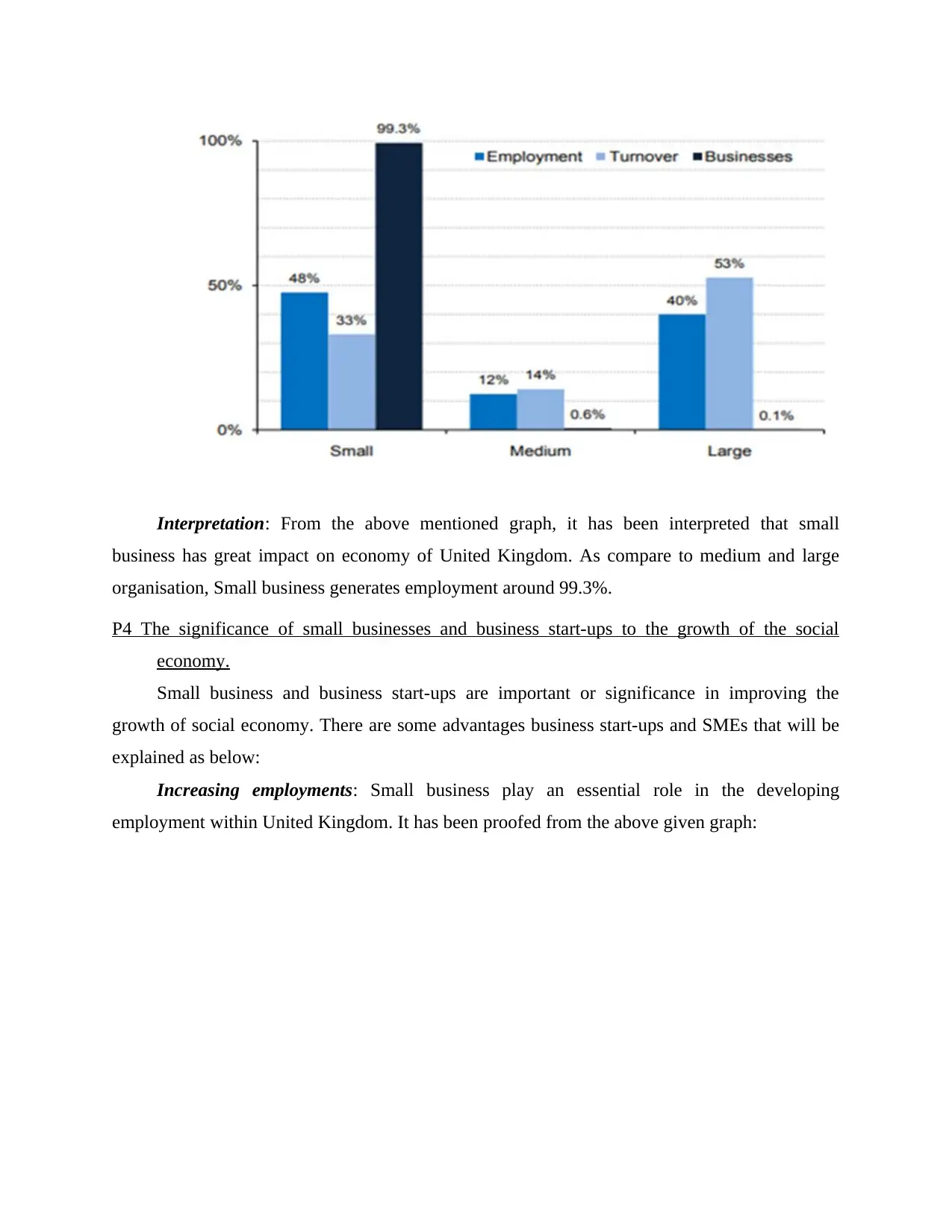
Interpretation: From the above mentioned graph, it has been interpreted that small
business has great impact on economy of United Kingdom. As compare to medium and large
organisation, Small business generates employment around 99.3%.
P4 The significance of small businesses and business start-ups to the growth of the social
economy.
Small business and business start-ups are important or significance in improving the
growth of social economy. There are some advantages business start-ups and SMEs that will be
explained as below:
Increasing employments: Small business play an essential role in the developing
employment within United Kingdom. It has been proofed from the above given graph:
business has great impact on economy of United Kingdom. As compare to medium and large
organisation, Small business generates employment around 99.3%.
P4 The significance of small businesses and business start-ups to the growth of the social
economy.
Small business and business start-ups are important or significance in improving the
growth of social economy. There are some advantages business start-ups and SMEs that will be
explained as below:
Increasing employments: Small business play an essential role in the developing
employment within United Kingdom. It has been proofed from the above given graph:
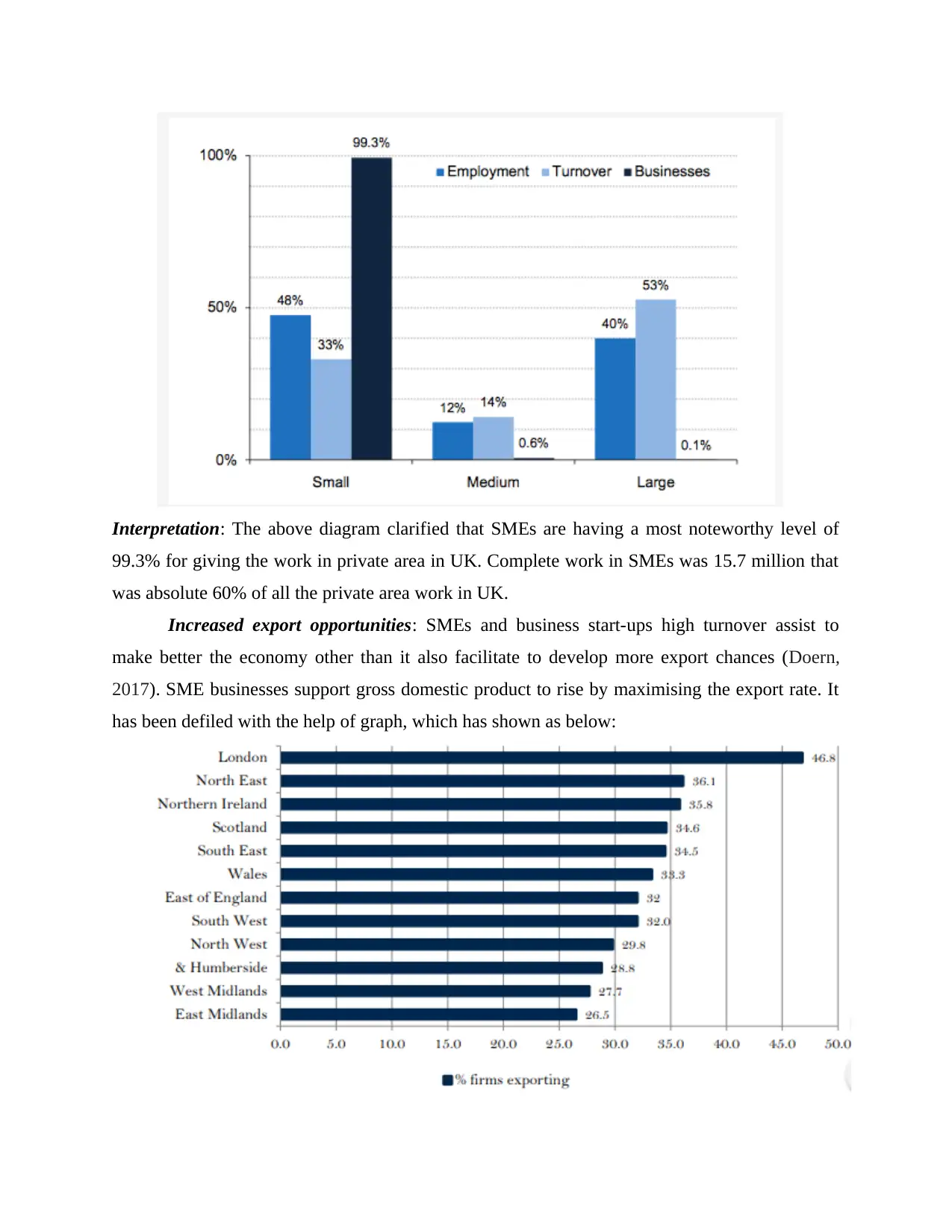
Interpretation: The above diagram clarified that SMEs are having a most noteworthy level of
99.3% for giving the work in private area in UK. Complete work in SMEs was 15.7 million that
was absolute 60% of all the private area work in UK.
Increased export opportunities: SMEs and business start-ups high turnover assist to
make better the economy other than it also facilitate to develop more export chances (Doern,
2017). SME businesses support gross domestic product to rise by maximising the export rate. It
has been defiled with the help of graph, which has shown as below:
99.3% for giving the work in private area in UK. Complete work in SMEs was 15.7 million that
was absolute 60% of all the private area work in UK.
Increased export opportunities: SMEs and business start-ups high turnover assist to
make better the economy other than it also facilitate to develop more export chances (Doern,
2017). SME businesses support gross domestic product to rise by maximising the export rate. It
has been defiled with the help of graph, which has shown as below:
⊘ This is a preview!⊘
Do you want full access?
Subscribe today to unlock all pages.

Trusted by 1+ million students worldwide
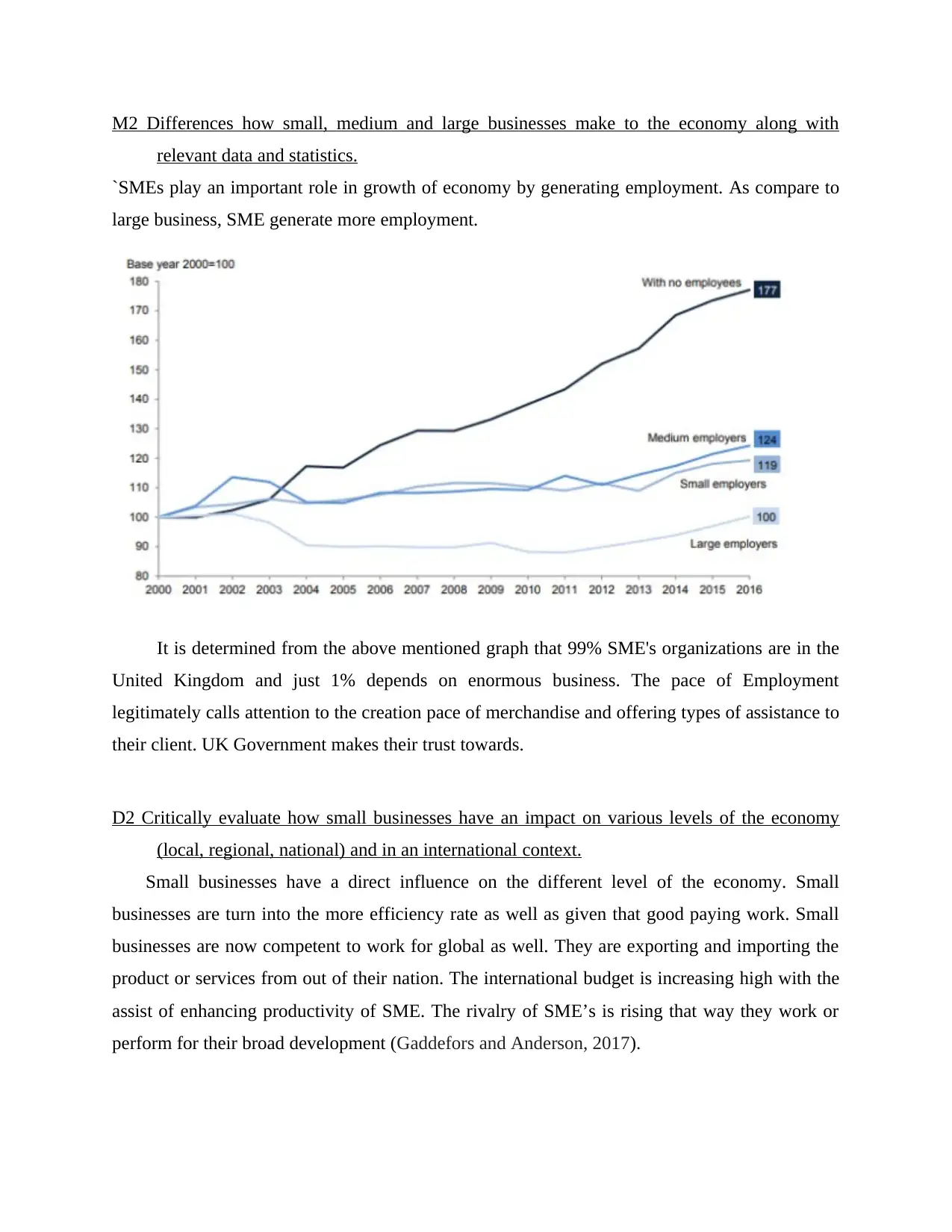
M2 Differences how small, medium and large businesses make to the economy along with
relevant data and statistics.
`SMEs play an important role in growth of economy by generating employment. As compare to
large business, SME generate more employment.
It is determined from the above mentioned graph that 99% SME's organizations are in the
United Kingdom and just 1% depends on enormous business. The pace of Employment
legitimately calls attention to the creation pace of merchandise and offering types of assistance to
their client. UK Government makes their trust towards.
D2 Critically evaluate how small businesses have an impact on various levels of the economy
(local, regional, national) and in an international context.
Small businesses have a direct influence on the different level of the economy. Small
businesses are turn into the more efficiency rate as well as given that good paying work. Small
businesses are now competent to work for global as well. They are exporting and importing the
product or services from out of their nation. The international budget is increasing high with the
assist of enhancing productivity of SME. The rivalry of SME’s is rising that way they work or
perform for their broad development (Gaddefors and Anderson, 2017).
relevant data and statistics.
`SMEs play an important role in growth of economy by generating employment. As compare to
large business, SME generate more employment.
It is determined from the above mentioned graph that 99% SME's organizations are in the
United Kingdom and just 1% depends on enormous business. The pace of Employment
legitimately calls attention to the creation pace of merchandise and offering types of assistance to
their client. UK Government makes their trust towards.
D2 Critically evaluate how small businesses have an impact on various levels of the economy
(local, regional, national) and in an international context.
Small businesses have a direct influence on the different level of the economy. Small
businesses are turn into the more efficiency rate as well as given that good paying work. Small
businesses are now competent to work for global as well. They are exporting and importing the
product or services from out of their nation. The international budget is increasing high with the
assist of enhancing productivity of SME. The rivalry of SME’s is rising that way they work or
perform for their broad development (Gaddefors and Anderson, 2017).
Paraphrase This Document
Need a fresh take? Get an instant paraphrase of this document with our AI Paraphraser

TASK 3
P5 Characteristic traits and skills of successful entrepreneurs that differentiate them from other
business managers.
There is huge difference between both entrepreneur and business manager. It is must to
ascertain knowledge over both aspects because it help in further development of personality and
career. The points that will be improved by an individual through consider the differences in
between the two include characteristics, skills and traits. The two successful entrepreneurs on
which focusing here are Zuber and Mohsin Issa. These are brothers and currently having the
successful business empire where recently taking over the ASDA from the US owners Walmart.
They started in year 2001 where only having the single petrol forecourt. Now, they expanded
their business in same line and having almost 5200 petrol stations where more than 33000 people
are working. The major reason behind the success of these both entrepreneur brothers is their
characteristics, skills and traits. So, all these in respect of both Zuber and Mohsin Issa are
defined below in detailed manner along with differentiation with business manager.
Characteristics
Honesty: Both the entrepreneurs having the honest character and always focus over
performing working practices honestly. They always trying to be fair with their employees and
providing their own piece of opportunities and benefits of which they credible. This quality of in
their character makes them different from the normal business manager because no manager
focuses over working in benefit of subordinates. Here, manages always having the perception of
taking benefit by own (Kimmitt and Muñoz, 2018).
1. Passionate: Both the entrepreneurs having passion towards their workings and goals.
This is reflected from their personality where they able to build the team of 33000
employees. This shows their significance of personality towards achievement of personal
and professional targets. In general, normal business managers do not have this kind of
characteristic because they always focus over performance of work instead of developing
team.
Skills
1. Time management: Both the entrepreneurs having the skill of time management. This is
the reason that they able to create the large business empire of almost 5200 petrol stations.
This skill is also shown from their gesture related to taking decision of expensing business
P5 Characteristic traits and skills of successful entrepreneurs that differentiate them from other
business managers.
There is huge difference between both entrepreneur and business manager. It is must to
ascertain knowledge over both aspects because it help in further development of personality and
career. The points that will be improved by an individual through consider the differences in
between the two include characteristics, skills and traits. The two successful entrepreneurs on
which focusing here are Zuber and Mohsin Issa. These are brothers and currently having the
successful business empire where recently taking over the ASDA from the US owners Walmart.
They started in year 2001 where only having the single petrol forecourt. Now, they expanded
their business in same line and having almost 5200 petrol stations where more than 33000 people
are working. The major reason behind the success of these both entrepreneur brothers is their
characteristics, skills and traits. So, all these in respect of both Zuber and Mohsin Issa are
defined below in detailed manner along with differentiation with business manager.
Characteristics
Honesty: Both the entrepreneurs having the honest character and always focus over
performing working practices honestly. They always trying to be fair with their employees and
providing their own piece of opportunities and benefits of which they credible. This quality of in
their character makes them different from the normal business manager because no manager
focuses over working in benefit of subordinates. Here, manages always having the perception of
taking benefit by own (Kimmitt and Muñoz, 2018).
1. Passionate: Both the entrepreneurs having passion towards their workings and goals.
This is reflected from their personality where they able to build the team of 33000
employees. This shows their significance of personality towards achievement of personal
and professional targets. In general, normal business managers do not have this kind of
characteristic because they always focus over performance of work instead of developing
team.
Skills
1. Time management: Both the entrepreneurs having the skill of time management. This is
the reason that they able to create the large business empire of almost 5200 petrol stations.
This skill is also shown from their gesture related to taking decision of expensing business
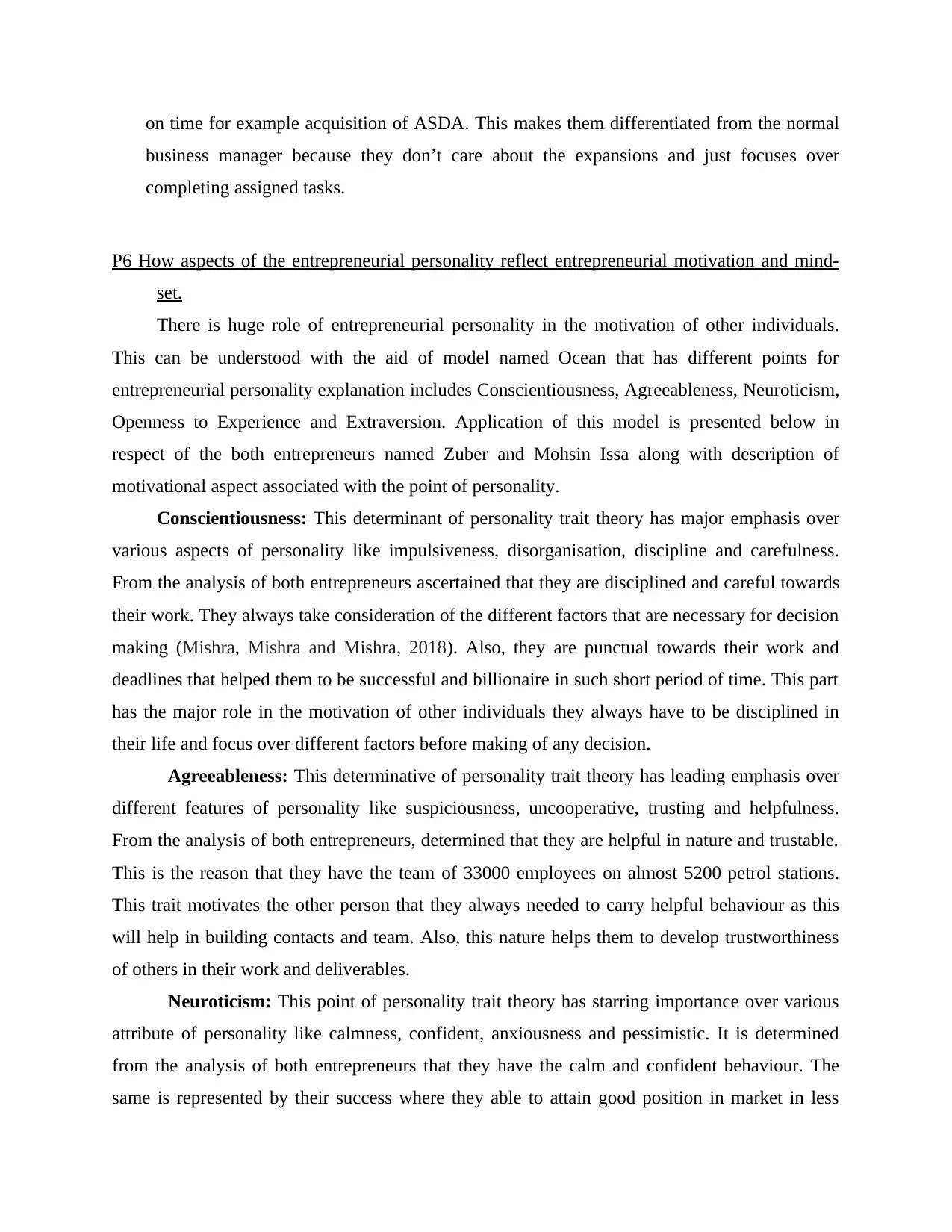
on time for example acquisition of ASDA. This makes them differentiated from the normal
business manager because they don’t care about the expansions and just focuses over
completing assigned tasks.
P6 How aspects of the entrepreneurial personality reflect entrepreneurial motivation and mind-
set.
There is huge role of entrepreneurial personality in the motivation of other individuals.
This can be understood with the aid of model named Ocean that has different points for
entrepreneurial personality explanation includes Conscientiousness, Agreeableness, Neuroticism,
Openness to Experience and Extraversion. Application of this model is presented below in
respect of the both entrepreneurs named Zuber and Mohsin Issa along with description of
motivational aspect associated with the point of personality.
Conscientiousness: This determinant of personality trait theory has major emphasis over
various aspects of personality like impulsiveness, disorganisation, discipline and carefulness.
From the analysis of both entrepreneurs ascertained that they are disciplined and careful towards
their work. They always take consideration of the different factors that are necessary for decision
making (Mishra, Mishra and Mishra, 2018). Also, they are punctual towards their work and
deadlines that helped them to be successful and billionaire in such short period of time. This part
has the major role in the motivation of other individuals they always have to be disciplined in
their life and focus over different factors before making of any decision.
Agreeableness: This determinative of personality trait theory has leading emphasis over
different features of personality like suspiciousness, uncooperative, trusting and helpfulness.
From the analysis of both entrepreneurs, determined that they are helpful in nature and trustable.
This is the reason that they have the team of 33000 employees on almost 5200 petrol stations.
This trait motivates the other person that they always needed to carry helpful behaviour as this
will help in building contacts and team. Also, this nature helps them to develop trustworthiness
of others in their work and deliverables.
Neuroticism: This point of personality trait theory has starring importance over various
attribute of personality like calmness, confident, anxiousness and pessimistic. It is determined
from the analysis of both entrepreneurs that they have the calm and confident behaviour. The
same is represented by their success where they able to attain good position in market in less
business manager because they don’t care about the expansions and just focuses over
completing assigned tasks.
P6 How aspects of the entrepreneurial personality reflect entrepreneurial motivation and mind-
set.
There is huge role of entrepreneurial personality in the motivation of other individuals.
This can be understood with the aid of model named Ocean that has different points for
entrepreneurial personality explanation includes Conscientiousness, Agreeableness, Neuroticism,
Openness to Experience and Extraversion. Application of this model is presented below in
respect of the both entrepreneurs named Zuber and Mohsin Issa along with description of
motivational aspect associated with the point of personality.
Conscientiousness: This determinant of personality trait theory has major emphasis over
various aspects of personality like impulsiveness, disorganisation, discipline and carefulness.
From the analysis of both entrepreneurs ascertained that they are disciplined and careful towards
their work. They always take consideration of the different factors that are necessary for decision
making (Mishra, Mishra and Mishra, 2018). Also, they are punctual towards their work and
deadlines that helped them to be successful and billionaire in such short period of time. This part
has the major role in the motivation of other individuals they always have to be disciplined in
their life and focus over different factors before making of any decision.
Agreeableness: This determinative of personality trait theory has leading emphasis over
different features of personality like suspiciousness, uncooperative, trusting and helpfulness.
From the analysis of both entrepreneurs, determined that they are helpful in nature and trustable.
This is the reason that they have the team of 33000 employees on almost 5200 petrol stations.
This trait motivates the other person that they always needed to carry helpful behaviour as this
will help in building contacts and team. Also, this nature helps them to develop trustworthiness
of others in their work and deliverables.
Neuroticism: This point of personality trait theory has starring importance over various
attribute of personality like calmness, confident, anxiousness and pessimistic. It is determined
from the analysis of both entrepreneurs that they have the calm and confident behaviour. The
same is represented by their success where they able to attain good position in market in less
⊘ This is a preview!⊘
Do you want full access?
Subscribe today to unlock all pages.

Trusted by 1+ million students worldwide
1 out of 16
Related Documents
Your All-in-One AI-Powered Toolkit for Academic Success.
+13062052269
info@desklib.com
Available 24*7 on WhatsApp / Email
![[object Object]](/_next/static/media/star-bottom.7253800d.svg)
Unlock your academic potential
Copyright © 2020–2026 A2Z Services. All Rights Reserved. Developed and managed by ZUCOL.



